As people willingly walk into the future, they are being lured by streaming this, virtual that, and the ever vague “cloud.” What they do not see or realize is the vanishing control of things they had taken for granted for so long.
The first crack in this “utopia” was when Amazon had to pull books from its bookstore because the entity selling them through Amazon did not have the rights to do so. Well, that’s all proper you’d say, but they also reached into the pockets of the end users who had bought those books, and took those books out of the buyers pockets.
They did this virtually by remotely deleting the books from the Amazon Kindle e-readers of people who had bought the rights-infringing books. But there was a certain irony in that one of the books Amazon secretly removed from the buyer’s ownership was George Orwell’s 1984, where the government censors erase all traces of news articles embarrassing to Big Brother by sending them down an incineration chute called the “memory hole.”
Are we headed that way too? And are we going there willingly?
So it turns out that you no longer really “own” the things you purchased with this virtual model.

The other thing it completely stops is any resale value to the tools.
There’s only _one_ person who will ever make money again from Adobe tools, and that’s Adobe.
Because you can’t resell a rental. Whereas, if someone just getting in to the biz wanted to buy my old CS2 for a few bucks, they could get the tools cheap, and I could sell off old stuff I was no longer using.
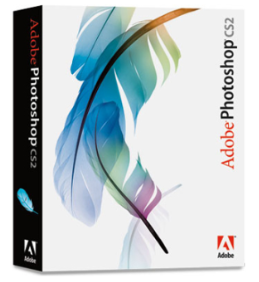
The same can be said for media soon. With media “in the cloud” and being able to stream on demand, there’s less incentive for the content sellers (not the authors, they only get paid once) to sell monthly access to content. If you ever get tired of paying, well, it’s tough on you because then, you own nothing. No books, no movies, no music, no games, no apps.
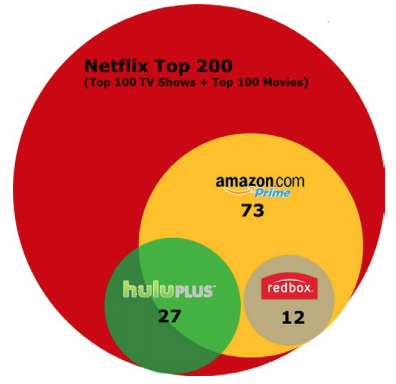
I mean, unless you had one of those paper thingies with pages and such. A book.
Because Amazon even demonstrated that, when needed, it can reach into your kindle and take back things you “purchased.”
Apple stops selling apps for click wheel iPods because, well, it wants to force those users to new iPods, no matter if those users want to buy the apps, and the makers of those apps want to keep selling them.

So when Adobe decides to stop making an app now, (like PageMaker, or PageMill, or …) then there will not be any legacy copy to keep using, or enable users to recover old, orphaned content.
A perfect example of this is Tap Tap Revenge by Tapulous.
I bought and downloaded many of the various versions of this fun iPhone music game. I paid for them. I downloaded them. They were mine. But there’s a problem. Tapulous, despite making about one million dollars a month and getting acquired by Disney, decided to close up shop. Stop making the apps and pull the apps from the App Store.
My iPhone 1 had four different versions of Tap Tap Revenge.
I upgraded to an iPhone 4. And I went to try and install those games on my new phone and the only one I could find was a new Tap Tap Revenge 4. But wait. I had the previous three. I downloaded them. They were mine. Where did they go?
Well, I don’t control the store and when something is pulled from the store, you don’t get to go get it any more. Even if you paid for it. Even if you want to pay for it again.
It’s like having your own chair at the office. You paid for it. You go in and use it every day. But you don’t control the office. And when the office suddenly closes shop without letting you know. Screw you. No more chair.

.
MY STORY.
I was recently handed some music files I comissioned in 1995. On the original floppies the composer saved them onto. I had to pull a lot of strings and favors to get them off of old 1.4 and 800k Mac floppies. I had to borrow hardware to read one floppy. A second disk I couldn’t read at all. So I sent it to a friend who still had an old Mac SE. The computer could read the disk, but the content was stuck on that computer.
He dug up some of Apple’s old networking hardware called LocalTalk and connected his SE to a Mac II that had a network card in it. A 10 Base-T ethernet card. So from the SE to the Mac II, from the Mac II to a newer Mac that was actually connected to the internet with current software. From that machine he put the files in a drop box that I could open and I suddenly could access the original music files.
Now that I had them I had to find someone to open them. Asking around I found several local composers who were also “Mac Heads” and one of them had not only his newest machine, but a few older ones. He had a habit of never getting rid of the systems he used before. They were just sort of frozen in time, stored away. I e-mailed him one of the files and he was able to open it and listen to the work that was created 15 years before.
Seeing how these solutions ONLY came from end users having the tools and software in their PERMANENT possession, I know that subscription-only apps and tools are a BAD idea for the long term future.
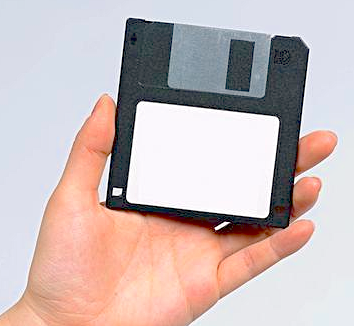
Without packrats and people keeping old computers, old OSes, and old apps, everything from before just goes away in a fog of unopenability. The big companies have clearly demonstrated there’s near zero interest in openly releasing orphaned software to the world. Orphaned software sites stand solely on the contributions by end purchasers of software, and a little bit of tolerance by the software companies.
That all goes away when Google buys Nic Software and kills Snapseed for Mac OS. Google kills Reader.

.
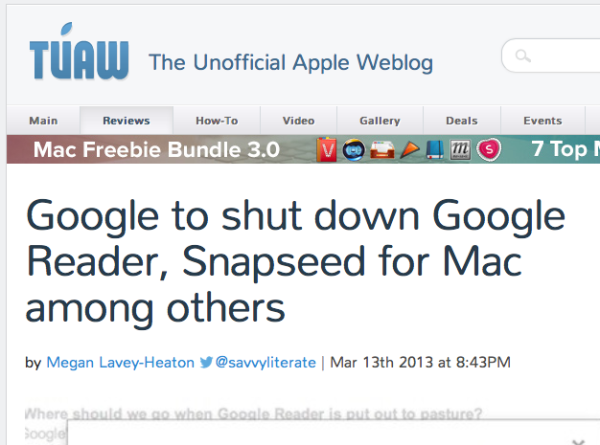
There’s NO guarantee, other than end-user ownership, that you’ll be able to keep doing what you do. No promise that Adobe won’t be bought by someone else 5 yeas from now, and that company has far different plans than you.
Would Apple, who essentially rebuilt their computer business from near bankruptcy with DV, Firewire, Final Cut Pro, and a whole ton of marketing about how they were the tools for “creatives”… Would Apple ever kill ALL the Pro apps overnight? No way. NO WAY! There was an entire industry built on working with Final Cut Studio after a decade of growth and maturation. We’re on a ROLL! Apple NEEDS us. We MADE them who they are today…
But even unfathomable things do happen. The company’s revenue had shifted FAR away from computers and “pro” apps to iPhones, iPods, music, movies, books, apps, games, yadda, yadda, yadda.
What if Final Cut Pro was subscription only and suddenly, because Apple decided to focus on the much higher revenue parts of their business, nobody’s copy of FCP worked any more?
.


Imagine that you can only rent a paintbrush to paint your paintings. But for whatever reason, you move on to other things for some time. You can’t touch your paintings till you rent that painbrush again, in fact, you can’t even open and look at the work in progress without going to Lowes and renting that very paintbrush.
To ever touch your paintings in the future, you have to keep renting the paintbrush.
Imagine if writing tools were like this.
Oh, you want to read that PDF? Nope. Sorry, you have to pay to activate Reader so you can open that document and copy a paragraph of text you want to use elsewhere.
It’s just completely antithetical to the creative process.
I do not like it.
THE SUBSCRIPTION MODEL
A whole subset to this App Store issue is making applications themselves only available via subscription.
For instance- Adobe took all their apps into the “cloud” called Creative Cloud. It’s not really a cloud. You download the apps from their servers. The apps stay on your computer. But you “lease” the usage of the apps on a yearly or month-to-month basis. The apps have to check in to the servers to make sure you’re still paid up, or else they self-deactivate.
There’s been much discussion of this. I will admit that I am currently a Creative Cloud customer. I make more using the tools than the tools cost per month. So it’s a sound business decision for me right now, but I still worry about being able to open projects years from now if I don’t have access to the tools. I worry enough to write this article.
.
So why did Adobe do this?
Creative Cloud is touted as being cheaper by Adobe. Especially if you were a power user and you upgraded to each new full “suite” as it came out. Not everyone has the money to ante up $1300 every couple years to get the full suite of apps.
http://www.adobe.com/products/creativecloud/buying-guide.html
“Entire collection of Creative Cloud tools at a fraction of the cost”
So CC is cheaper for power users who used to buy buy every upgrade to get new features. So, even though the revenue stream is more regular, it’s “a fraction of the cost” for Adobe than $1300 every 1.5 years for a new perpetual license.
In their March 2013 10Q report, Adobe says: (p.28)
“we expect this business model transition will significantly increase our long-term revenue growth rate by attracting new users, keeping our end user base current and thereby driving higher average revenue per user.”
http://wwwimages.adobe.com/www.adobe.com/content/dam/Adobe/en/investor-relations/PDFs/ADBE_10Q_Q113_FINAL_CERTIFIED.pdf
So if CC means each person is paying a “fraction of the cost“ you have to wonder how a “higher average revenue per user“ is realized. We’re not talking growth in market. Adobe is saying each and every user will generate higher revenue with CC.
I’m quoting Adobe here, and comparing marketing PR to us versus financial reporting to investors.
If my out of pocket goes down because of the significant savings, there’s only one way Adobe could legally tout higher average revenue from me- the costs to make the product have to go down. What will they cut? You can’t cut manufacturing costs for a virtual product… What gets cut?
Anyway, The difference is, one way you own it. The other you don’t.
Like paying $500 a month for a car, for 5 years.
If you bought it, the payments stop and you keep driving.
If you leased it, then you stand in the garage where your car used to be.
Or put it another way, what if Apple decided to do Creative Cloud first…
And decided to kill the Pro Apps, just like they did, overnight.
All us creatives would be in a whole bag of hurt.
And there’s nothing saying that Adobe can’t be bought, sold, the economy tanks, they go out of business, they pull a Tapulous and just decide to close shop, or maybe Adobe’s servers go down…

I can only hope this major glitch in the system opens Adobe’s eyes and they institute some sort of permanent copy solution for end users.
I read a suggestion that, after two years of subscription, any Creative Cloud subscriber ought to receive their current software in a “perpetual license” copy. They’ve essentially paid what used to be the complete box set price. Now give them, us, me, a copy of that software- fixed at this version- that I can keep, back up, and is self-authorized and does not require the use of a server anywhere to run.
So a decade from now, when the world is a different place, this piece of stand-alone software may be used to open what might otherwise be lost. I am appreciative that, for me, I was able to find people who still had old hardware and old software to open up my 15 year old files and make them usable again. With today’s Orwellian App Stores and subscription-only content and tools, the end user is powerless.
Let the end-user control their own fate. Give control back to us.


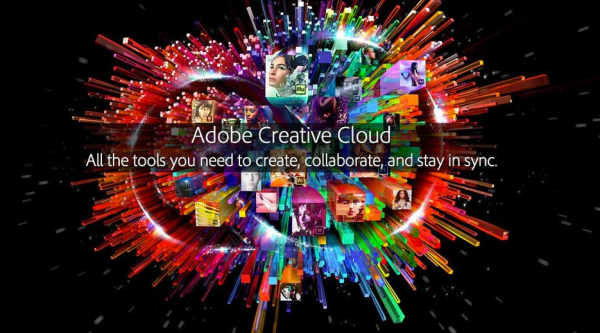

Leave a comment